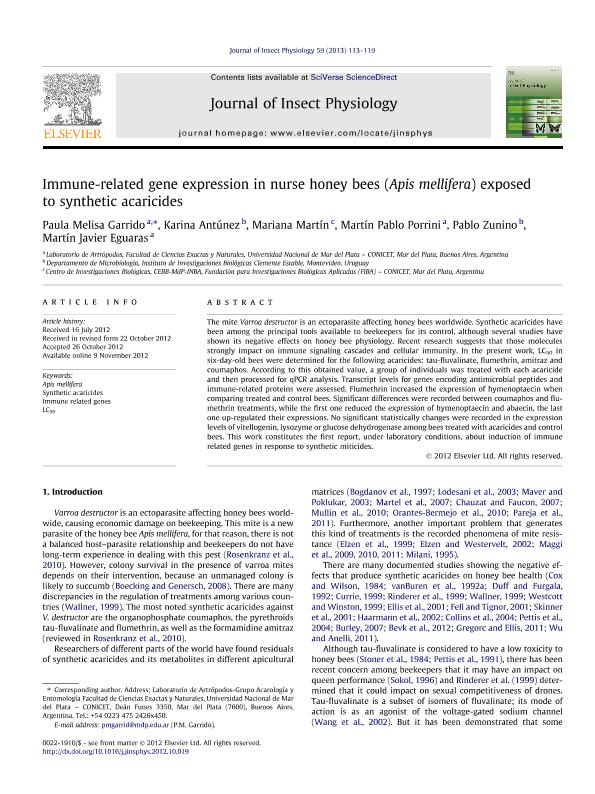Artículo
Immune-related gene expression in nurse honey bees (Apis mellifera) exposed to synthetic acaricides
Garrido, Paula Melisa ; Antúnez, Karina; Martin, Mariana Laura
; Antúnez, Karina; Martin, Mariana Laura ; Porrini, Martín Pablo
; Porrini, Martín Pablo ; Zunino, Pablo; Eguaras, Martin Javier
; Zunino, Pablo; Eguaras, Martin Javier
 ; Antúnez, Karina; Martin, Mariana Laura
; Antúnez, Karina; Martin, Mariana Laura ; Porrini, Martín Pablo
; Porrini, Martín Pablo ; Zunino, Pablo; Eguaras, Martin Javier
; Zunino, Pablo; Eguaras, Martin Javier
Fecha de publicación:
02/2013
Editorial:
Pergamon-Elsevier Science Ltd.
Revista:
Journal of Insect Physiology
ISSN:
0022-1910
Idioma:
Inglés
Tipo de recurso:
Artículo publicado
Clasificación temática:
Resumen
The mite Varroa destructor is an ectoparasite affecting honey bees worldwide. Synthetic acaricides have been among the principal tools available to beekeepers for its control, although several studies have shown its negative effects on honey bee physiology. Recent research suggests that those molecules strongly impact on immune signaling cascades and cellular immunity. In the present work, LC50 in six-day-old bees were determined for the following acaricides: tau-fluvalinate, flumethrin, amitraz and coumaphos. According to this obtained value, a group of individuals was treated with each acaricide and then processed for qPCR analysis. Transcript levels for genes encoding antimicrobial peptides and immune-related proteins were assessed. Flumethrin increased the expression of hymenoptaecin when comparing treated and control bees. Significant differences were recorded between coumaphos and flumethrin treatments, while the first one reduced the expression of hymenoptaecin and abaecin, the last one up-regulated their expressions. No significant statistically changes were recorded in the expression levels of vitellogenin, lysozyme or glucose dehydrogenase among bees treated with acaricides and control bees. This work constitutes the first report, under laboratory conditions, about induction of immune related genes in response to synthetic miticides.
Palabras clave:
Apis Mellifera
,
Synthetic Acaricides
,
Immune Related Genes
,
Lc50
Archivos asociados
Licencia
Identificadores
Colecciones
Articulos(CCT - MAR DEL PLATA)
Articulos de CTRO.CIENTIFICO TECNOL.CONICET - MAR DEL PLATA
Articulos de CTRO.CIENTIFICO TECNOL.CONICET - MAR DEL PLATA
Citación
Garrido, Paula Melisa; Antúnez, Karina; Martin, Mariana Laura; Porrini, Martín Pablo; Zunino, Pablo; et al.; Immune-related gene expression in nurse honey bees (Apis mellifera) exposed
to synthetic acaricides; Pergamon-Elsevier Science Ltd.; Journal of Insect Physiology; 59; 1; 2-2013; 113-119
Compartir
Altmétricas



